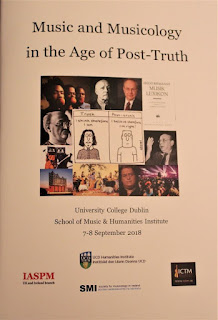I’ve devoted much of this blog to challenging the stereotype that classical composers are all “dead, white men,” even though the canon makes it seem that way. So far, I’ve only addressed the “men” part, in several posts and a guest post.
Yet I haven’t written as much about the “white” part, mostly because it’s uncomfortable to discuss racism as a white person in the US—especially in connection to something I love, something I’ve built into my identity. It’s hard to talk from the privileged position without inadvertently making assumptions (which is why I’ve sent drafts of this post to many people for feedback).
But recent events have challenged my perspective, to the point that the “whiteness” of classical music is something I can’t not address anymore. I must push beyond any discomfort because this is a conversation that needs to happen, especially in the current political environment.
Debunking myths and calling out lazy writing in published articles about classical music.
Thursday, September 27, 2018
Who wrote the symphonies, and why should it matter?
Tuesday, September 11, 2018
Report from "Music and Musicology in the Age of Post-Truth" (with link to the paper I delivered there)
Hello! If you haven't been following this blog on Facebook or Twitter, you may be wondering why I haven't updated the blog for a few months. I was preparing for a conference last week in Dublin, Ireland, where I delivered a paper and had some incredible conversations with fellow music scholars who share some of my concerns about music and its role in today's society.
When I saw that the conference title was "Music and Musicology in the Age of Post-Truth" and read the call for papers, I knew it was a great fit for my views as a scholar and the mission of my blog. Mythbusting is a quest for verifiable truth, and I do my best to explain how certain myths endure and why people choose to believe them.
Since this conference intended to reflect on present culture, I realized I had to step away from my nineteenth-century comfort zone and find something recent to investigate. I pitched a paper that would be an offshoot of the lecture I delivered at Utah State University last January, which dealt with the perception of classical music as cultivating better morals in its listeners. Since the presentation could only be twenty minutes long (with ten additional minutes for questions and discussion), I had to narrow my focus. So, I chose one of the hottest topics in classical music at the moment: the scandals surrounding former Metropolitan Opera conductor James Levine.
When I saw that the conference title was "Music and Musicology in the Age of Post-Truth" and read the call for papers, I knew it was a great fit for my views as a scholar and the mission of my blog. Mythbusting is a quest for verifiable truth, and I do my best to explain how certain myths endure and why people choose to believe them.
 |
| Programme booklet for the Music and Musicology in the Age of Post-Truth conference. |
Since this conference intended to reflect on present culture, I realized I had to step away from my nineteenth-century comfort zone and find something recent to investigate. I pitched a paper that would be an offshoot of the lecture I delivered at Utah State University last January, which dealt with the perception of classical music as cultivating better morals in its listeners. Since the presentation could only be twenty minutes long (with ten additional minutes for questions and discussion), I had to narrow my focus. So, I chose one of the hottest topics in classical music at the moment: the scandals surrounding former Metropolitan Opera conductor James Levine.
Subscribe to:
Posts (Atom)